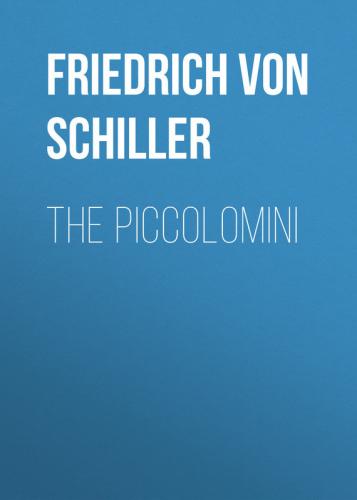But such a one as he can serve the army.
The army? Doubtless!
What delight to observe
How he incites and strengthens all around him,
Infusing life and vigor. Every power
Seems as it were redoubled by his presence
He draws forth every latent energy,
Showing to each his own peculiar talent,
Yet leaving all to be what nature made them,
And watching only that they be naught else
In the right place and time; and he has skill
To mould the power's of all to his own end.
But who denies his knowledge of mankind,
And skill to use it? Our complaint is this:
That in the master he forgets the servant,
As if he claimed by birth his present honors.
And does he not so? Is he not endowed
With every gift and power to carry out
The high intents of nature, and to win
A ruler's station by a ruler's talent?
So then it seems to rest with him alone
What is the worth of all mankind beside!
Uncommon men require no common trust;
Give him but scope and he will set the bounds.
The proof is yet to come.
Thus are ye ever.
Ye shrink from every thing of depth, and think
Yourselves are only safe while ye're in shallows.
'Twere best to yield with a good grace, my friend;
Of him there you'll make nothing.
In their fear
They call a spirit up, and when he comes,
Straight their flesh creeps and quivers, and they dread him
More than the ills for which they called him up.
The uncommon, the sublime, must seem and be
Like things of every day. But in the field,
Ay, there the Present Being makes itself felt.
The personal must command, the actual eye
Examine. If to be the chieftain asks
All that is great in nature, let it be
Likewise his privilege to move and act
In all the correspondences of greatness.
The oracle within him, that which lives,
He must invoke and question – not dead books,
Not ordinances, not mould-rotted papers.
My son! of those old narrow ordinances
Let us not hold too lightly. They are weights
Of priceless value, which oppressed mankind,
Tied to the volatile will of their oppressors.
For always formidable was the League
And partnership of free power with free will.
The way of ancient ordinance, though it winds,
Is yet no devious path. Straight forward goes
The lightning's path, and straight the fearful path
Of the cannon-ball. Direct it flies, and rapid;
Shattering that it may reach, and shattering what it reaches,
My son, the road the human being travels,
That, on which blessing comes and goes, doth follow
The river's course, the valley's playful windings,
Curves round the cornfield and the hill of vines,
Honoring the holy bounds of property!
And thus secure, though late, leads to its end.
Oh, hear your father, noble youth! hear him
Who is at once the hero and the man.
My son, the nursling of the camp spoke in thee!
A war of fifteen years
Hath been thy education and thy school.
Peace hast thou never witnessed! There exists
An higher than the warrior's excellence.
In war itself war is no ultimate purpose,
The vast and sudden deeds of violence,
Adventures wild, and wonders of the moment,
These are not they, my son, that generate
The calm, the blissful, and the enduring mighty!
Lo there! the soldier, rapid architect!
Builds his light town of canvas, and at once
The whole scene moves and bustles momently.
With arms, and neighing steeds, and mirth and quarrel
The motley market fills; the roads, the streams
Are crowded with new freights; trade stirs and hurries,
But on some morrow morn, all suddenly,
The tents drop down, the horde renews its march.
Dreary, and solitary as a churchyard;
The meadow and down-trodden seed-plot lie,
And the year's harvest is gone utterly.
Oh, let the emperor make peace, my father!
Most gladly would I give the blood-stained laurel
For the first violet5 of the leafless spring,
Plucked in those quiet fields where I have journeyed.
What ails thee? What so moves thee all at once?
Peace have I ne'er beheld? I have beheld it.
From thence am I come hither: oh, that sight,
It glimmers still before me, like some landscape
Left in the distance, – some delicious landscape!
My road conducted me through countries where
The war
